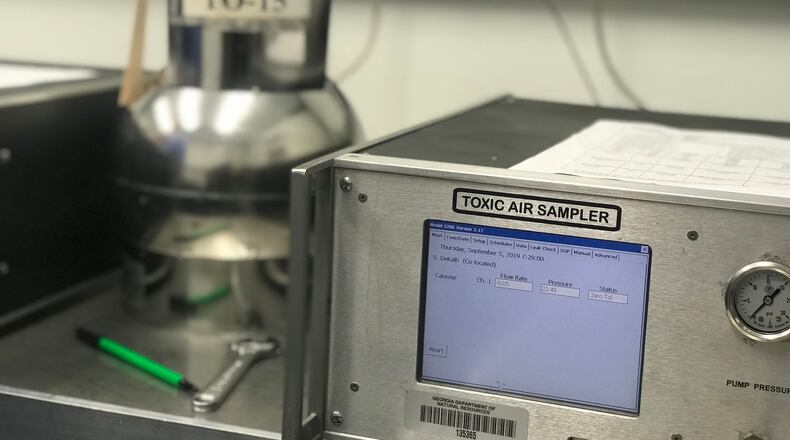A medical sterilization company in Fulton County must pay the state a $51,000 fine after missing its deadline to install filters to reduce emissions of a cancer-causing gas.
Sterilization Services of Georgia was violating the state Air Quality Act because it hadn't installed new pollution controls meant to reduce emissions of ethylene oxide, according to a Jan. 20 letter from the state Environmental Protection Division.
The company uses ethylene oxide to sterilize single-use medical devices, and has a permit to legally emit it from a facility off Fulton Industrial Boulevard. The permit required installation of filters to reduce emissions from the plant by 99 percent.
BACKGROUND | State, Fulton plant make deal to reduce ethylene oxide emissions
Karen Hays, head of EPD’s air protection branch, told the Fulton County Board of Commissioners that the company had the filters operational by Jan. 18, and was fined $3,000 for every day beyond the Dec. 31 deadline to which it agreed.
Company officials did not reply to a request for comment Monday.
The state EPD issued a permit in November requiring the Fulton plant to install dry bed reactors — which react with the gas and filter the chemical before it leaves the plant, according to Richard Peltier, an expert in air pollution exposure at the University of Massachusetts, Amherst.
BACKGROUND | Fulton County test air for ethylene oxide in Fulton industrial area
But company officials notified the state in mid-December that construction had been delayed. So the company and EPD signed a deal in January, agreeing to the daily fines until it was in compliance.
Sara Lips, a spokeswoman with the EPD, said the money will go to the state treasury. Lips said that EPD is also performing ambient air testing near the facility.
Many Georgians first learned about ethylene oxide over the summer. A July report by WebMD and Georgia Health News highlighted potential increased cancer risks at two plants — Sterigenics in Cobb County and Becton Dickinson in Covington.
An investigation by The Atlanta Journal-Constitution found that, until the recent attention, the state EPD has relied solely on the companies to report their emissions. Georgia has a history of being industry-friendly when it comes to environmental regulation. But the state has recently taken a harder line after the public displayed outrage in protests and town hall meetings.
Commissioner Arrington: ‘I was very shocked’
The Fulton County Board of Commissioners contracted in September with Arkansas-based air testing consultant GHD Services to analyze the air around Sterilization Services of Georgia.
Hays, the EPD air protection branch head, told Fulton commissioners that GHD also tested the air around the Sterigenics plant.
“We paid those guys and girls $70,000 to come in and check things out for us,” said Fulton Commissioner Joe Carn. “…They gave us a report that said everything was absolutely fine, despite being above the EPA levels.”
Company officials told the Board in December that nearly all of the air quality test results showed the amount of ethylene oxide in the area of the Fulton County plant exceeded federal safety standards. The U.S. Environmental Protection Agency predicts lifetime exposure above its threshold can cause 100 additional cancer cases per 1 million people.
READ| Sterigenics says it suspended operations after July 2018 explosion
READ | For cancer survivors, Sterigenics raises haunting questions
Dyron Hamlin, with GHD, in December acknowledged that almost all the samples exceeded the EPA limit. But he said they were below the standard considered safe by the industry — and below a standard set in a controversial Texas draft study that claims the gas is less dangerous than the federal government has determined.
Carn and Commissioner Marvin Arrington said last week that the board should consider asking GHD to come back and better explain its findings.
“I was very shocked after the last presentation,” Arrington said. “They said that there was nothing to find, and then the very next day in the AJC, the reports were that the results were higher than the industry standards, and that the results that (GHD) provided I guess were obfuscated by standards set by industry lobbyists.”
Hays said there is a lot of disagreement between experts about safe levels of ethylene oxide exposure.
“The information that we have is confusing and somewhat contradictory,” she said.
Hays added: “Georgia EPD has no position in that debate.”
Like North Fulton County News Now on Facebook | Follow us on Twitter
How we got here
Sterilization Services of Georgia, the third plant in metro Atlanta to gain attention for its use of the cancer-causing gas ethylene oxide, agreed to install filters by Dec. 31 that would reduce emissions from the Fulton County facility by 99 percent. The company and state Environmental Protection Division signed a deal in January that stipulated a $3,000 daily fine until they were installed. State officials say the filters were installed Jan. 18, so the company must pay a $51,000 fine. Other facilities in metro Atlanta using the gas are Sterigenics in Cobb County and Becton Dickinson in Covington.
About the Author
Keep Reading
The Latest
Featured



